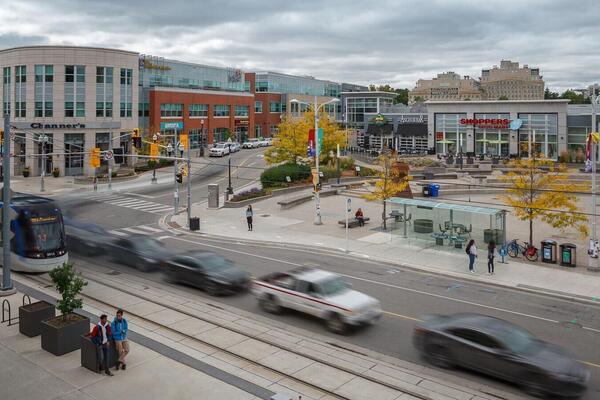
Waterloo supports front line of COVID-19 pandemic
From research to 3D-printed masks and equipment donations, the University community is mobilizing to combat the coronavirus here at home and globally

From research to 3D-printed masks and equipment donations, the University community is mobilizing to combat the coronavirus here at home and globally
By Natalie Quinlan University Relations
Two van loads of personal protective equipment supplies delivered to a regional distribution hub on Friday, March 27.
In the wake of COVID-19, Canada is calling on communities to fight a global pandemic.
At home, the University of Waterloo is offering the skills, time and resources to help against the spread of the coronavirus.
“I want to acknowledge and thank our researchers, students, staff and alumni who are stepping in to respond to the urgent needs facing the Waterloo region,” says Feridun Hamdullahpur, president and vice-chancellor of the University of Waterloo. “This is a time we can all work together with health-care practitioners, governments, public health officials and industry to slow the spread of coronavirus and support front line health-care workers.”
Meanwhile, 3D printing labs across campus are producing medical equipment like face shield parts and devices that are in short supply for local hospitals. Up to 50 engineered polymeric headbands and bottom reinforcements are being developed in the Multi-Scale Additive Manufacturing (MSAM) Laboratory. Waterloo’s Print and Retail Solutions are also shifting priorities, 3D-printing parts that will contribute to medical shields for hospitals in Waterloo region and continuing production seven days a week, 24-hours a day.
“In normal times, Print and Retail Solutions’ 3D printers are busy printing prototypes for student projects and campus labs,” Ryan Jacobs, director of Print and Retail Solutions. “Following a recent call out to the community for parts for the face shields, our 3D printers are now furiously churning out these parts for assembly and use by medical staff in Waterloo Region’s hospitals.”

3D printing labs across campus are producing medical equipment like face shield parts and devices that are in short supply for local hospitals.
Waterloo's alumni, even as far away as the Shanghai chapter, have also come together to raise money and purchase medical equipment for two hospitals in Wuhan, China.
 Researchers at the University of Waterloo have partnered with an artificial intelligence (AI) startup on a project that aims to use AI to improve COVID-19 screening. This technology will help health professionals diagnose COVID-19 through x-rays, while other AI platforms are monitoring social media for new outbreaks. Students are also offering their time, volunteering to leverage big data in the fight against COVID-19
Researchers at the University of Waterloo have partnered with an artificial intelligence (AI) startup on a project that aims to use AI to improve COVID-19 screening. This technology will help health professionals diagnose COVID-19 through x-rays, while other AI platforms are monitoring social media for new outbreaks. Students are also offering their time, volunteering to leverage big data in the fight against COVID-19
On the entrepreneurial front, the University’s Velocity incubator in Kitchener is prioritizing the spring intake for health startups focusing on COVID-19. Other businesses with University of Waterloo connections like MeshAI.io, Open Food Network Canada and Think Research are modifying their company models to respond to the pandemic with virtual health-care support, locally produced food delivery access and offering virtual visit technology into hospitals and long-term care homes across the country.
“I am very proud of the Waterloo community who has joined together during this difficult time and demonstrated its commitment and innovative spirit to help health-care partners facing significant challenges related to COVID-19. We’re seeing partnerships with industry and government to mobilize strategies and solutions to support Canadians and people around the world in this unprecedented situation,” says Charmaine Dean, vice-president, Research and International. “We extend our heartfelt thanks to all those on the frontlines in this crisis and, at Waterloo, we are doubling-down and working hard to develop solutions to support our health-care teams.”
As Waterloo heads into the spring term, faculty and staff members are creating alternative and creative ways of teaching students. Programs like Waterloo’s CEMC at Home, developed by the Centre for Education in Mathematics and Computing, offers a wide variety of ways for youth in Grades 4 to 12 to engage in mathematics and computer science while staying at home. The initiative has been adopted by the Government of Ontario as a supplementary resource for elementary and secondary students.
Other University support systems to support the Waterloo campus community at this time include the creation of an introductory module to online learning for students, websites to help instructors pivot to teaching online and virtual wellness activities that encourage a healthy lifestyle at home.

Key areas are highlighted in pink in these chest radiology images of two patients with COVID-19
Read more
Waterloo researchers lead open-source project to improve COVID-19 screening using artificial intelligence (AI) and chest x-rays

Read more
Here are the people and events behind some of this year’s most compelling Waterloo stories

Read more
It Started in Waterloo: An Astronaut's Journey into the Universe of Innovation, narrated by Chris Hadfield, highlights the University of Waterloo’s role in igniting innovation within the region and beyond.
The University of Waterloo acknowledges that much of our work takes place on the traditional territory of the Neutral, Anishinaabeg, and Haudenosaunee peoples. Our main campus is situated on the Haldimand Tract, the land granted to the Six Nations that includes six miles on each side of the Grand River. Our active work toward reconciliation takes place across our campuses through research, learning, teaching, and community building, and is co-ordinated within the Office of Indigenous Relations.